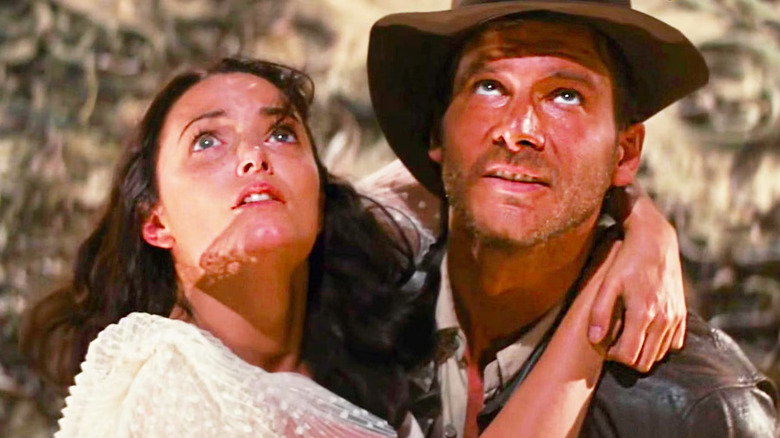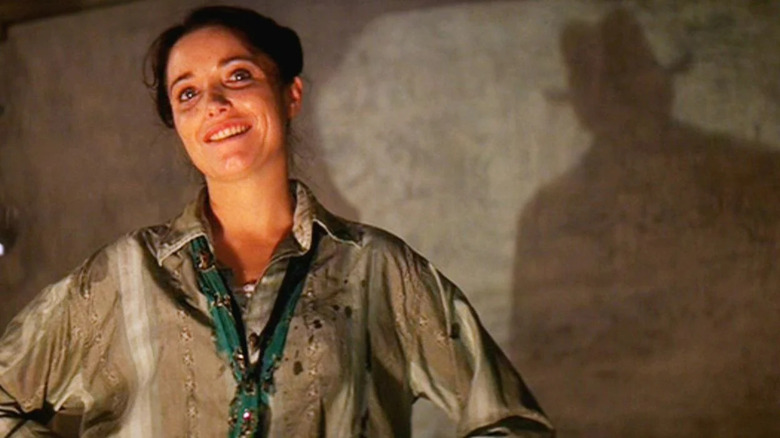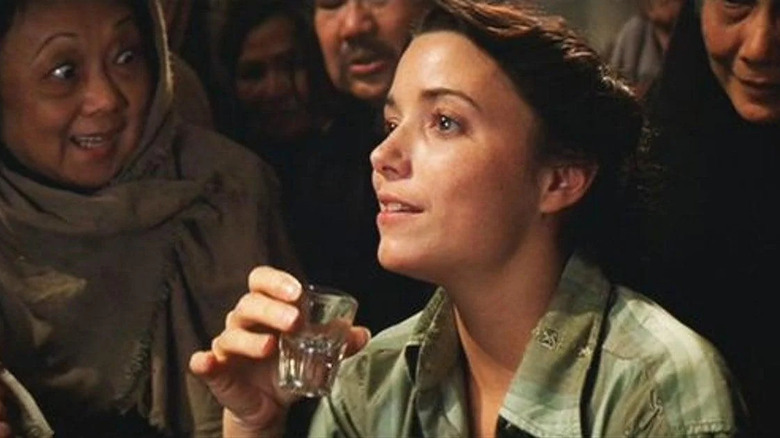One Indiana Jones Actor Secretly Hated The Title Raiders Of The Lost Ark At First
Sometimes a title of a movie is everything. It's hard to imagine that "Blade Runner" or "Die Hard" would have become as recognizably famous as they are now without their filmmakers co-opting those snazzy titles. One filmmaker who's consistently chosen distinct, eye-grabbing titles for his films is Steven Spielberg. There are the to-the-point emotional titles ("Jaws," "E.T.," "Hook"), the mysterious and intriguing ones ("Close Encounters of the Third Kind," "Empire of the Sun," "The BFG"), and the descriptive ones ("1941," "Schindler's List," "Saving Private Ryan").
Upon watching the movie, the title "Raiders of the Lost Ark" falls neatly into this latter category. Yet for people new to the adventures of the original character Indiana Jones back in 1981, it must've seemed not just mysterious, but borderline confusing. Who are these "raiders?" What is this "lost ark?" And why are they raiding it at all?
That's precisely the take on the title one of the cast members of "Raiders" had when they first heard it. This actor was no supporting player, either: it was Karen Allen, Marion Ravenwood herself, who not only balked at the proposed title but assumed it would be changed before the movie came out.
'What a terrible name for a film'
Fortunately for Allen (and cinema history), her first encounter with the "Raiders" project wasn't through the screenplay, but rather through her already existing desire to work with Spielberg. As the actress recalled while speaking to Forbes in 2021:
"Oh, I really wanted to get it. When I first met with Steven, I had not read the screenplay. I was just going in to talk, and we were meeting for the first time. He had seen a couple of films I had done with friends of his who were directors, and he just wanted to meet me. They wanted me to audition, and they gave me the scene in The Raven bar when I'm drinking the men under the table, and then Indiana Jones comes in, and I punch him in the face."
Later, Allen was given the script of the film, and had an adverse reaction to it right from the first page:
"I remember when they first gave me the script to read, and it said on the top of it, 'Raiders of the Lost Ark,' I thought, 'What a terrible name for a film. Surely they'll change that before it comes out?'"
As it happens, the title was not changed, "Raiders of the Lost Ark" was released in June of 1981, and it went on to gross $389.9 million and start the "Indiana Jones" franchise.
Indiana Smith and the Raiders of the Lost Ark
The "Raiders of the Lost Ark" title wasn't the only odd element to emerge during the conception of the film. Originally, co-creator George Lucas thought that the hero character's name might be Indiana Smith, not Jones. During a 1978 story conference between Lucas, Spielberg, and writer Lawrence Kasdan, the iconic name of the character hung in the balance for a brief moment:
"Kasdan: Do you have a name for this person?
Lucas: I do for our leader.
Spielberg: I hate this, but go ahead.
Lucas: Indiana Smith. It has to be unique. It's a character. Very Americana square. He was born in Indiana.
Kasdan: What does [Marion] call him, 'Indy?'
Lucas: That's what I was thinking. Or Jones. Then people can call him 'Jones.'"
Again, history prevailed, and "Indiana Jones" stuck. It stuck so much that the next several entries in the franchise were not called "Raiders," but rather "Indiana Jones and the Temple of Doom," "Indiana Jones and the Last Crusade," and so on. As a result, the character's name became associated with the films so much that the original "Raiders" title suddenly seemed as out of place as Allen thought it was, at least to Lucas. For that reason, he's officially changed the movie's title to "Indiana Jones and the Raiders of the Lost Ark" since 2000, although the actual on-screen title of the film has remained the same.
Ironically, that title change has caused a lot of fans to scoff and insist that the movie still be simply called "Raiders of the Lost Ark." Funny how something that seemed odd and off-putting initially became so entrenched in pop culture and beloved by audiences. Chalk that up to the power of originality!


